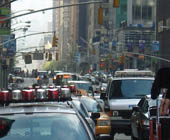 There are those who believe that the only way to stop the excesses of markets is to build a massive framework of rules and regulations to bar every possibility of abuse. Such structures make economies resemble prisons rather than free markets.
There are those who believe that the only way to stop the excesses of markets is to build a massive framework of rules and regulations to bar every possibility of abuse. Such structures make economies resemble prisons rather than free markets.
Their promoters fail to recognize that this is a moral problem not a regulatory one. It is much easier to establish a set of simple rules in a climate of virtue and commonsense than to impose a tome of decrees that controls the minutest details in an atmosphere of frenetic intemperance.
One example can be found in the United Kingdom’s Financial Services Authority (FSA), a regulatory authority that oversees financial institutions. To illustrate this point, Philip Booth, a professor at Cass Business School in London, describes the FSA’s regulatory handbook:
“[The FSA] regulatory handbook contains ten sections. The section titled “Prudential Standards” is divided into eleven subsections. The subsection “Prudential Sourcebook for Banks, Building Societies and Investment Firms” is made up of fourteen sub-subsections. The sub-subsection “Market Risk” is divided into eleven sub-sub-subsections. The sub-sub-subsection on “Interest Rate PRR” has sixty-six paragraphs.”
Booth comments about how this complex handbook has over 1,100,000 paragraphs and is touted by the FSA as “principle-based, light-touch regulation.”
He observes that, “Essentially, regulators are trying to do a job that cannot be done – closely regulate the investment-banking system through detailed rules.” In fact, Booth notes that such regulation usually provokes the finance industry to rise to the challenge and circumvent the regulations by creating new even more opaque financial instruments – which in turn lead to yet more regulation…
(Quotes from Philip Booth, “The Crash of 2008,” Samuel Gregg and Harold James eds., Natural Law, Economics, and the Common Good, Imprint Academic, Charlottesville, 2012, p. 234.)

Public domain photo by Kaihsu Tai



